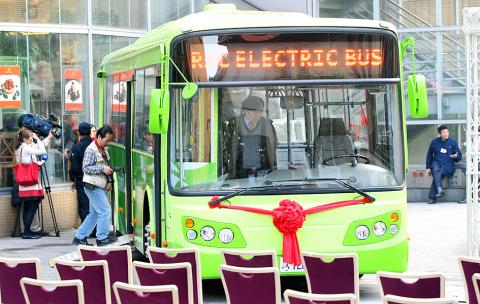One newcomer in the burgeoning Taiwanese electric vehicle industry is aiming high — it intends to work with automakers and bus operators in overseas markets, such as the Philippines, Hong Kong and the US, to market its technologies over the next three years.
RAC Electric Vehicles Inc (華德動能科技) is one step closer to achieving its ambition after it signed a deal yesterday to clinch its first client in the Philippines, which purchased an electric bus produced by the company.
RAC hopes its first bus to Victory Liner Inc, the largest operator in the Philippines that runs a fleet of 4,500 coaches, will open the door for a possible joint venture to produce electric vehicles in the Southeast Asian country.

Photo: CNA
“We plan to export our technologies to Victory Liner, assisting it in establishing production facilities,” RAC president Alex Tsai (蔡易忠) said on the sidelines of a signing ceremony in Taipei witnessed by Vice Minister of Economic Affairs Francis Liang (梁國新).
The company is banking on the Philippines to aggressively deploy “green” vehicles to cut carbon emissions and conserve energy, and its partnership with Victory Liner offers it a great advantage.
Despite Victory Liner having only purchased one electric bus for the time being, Tsai said the bus marks a significant milestone for RAC because government officials, including Philippine President Benigno Aquino III, is expected take a ride on the bus, making it a showcase of what Taiwanese companies could offer in terms of technological advancement.
According to an RAC statement, more projects between RAC and Victory Liner are on the way, such as co-producing electric--powered tricycles and jeepneys in the future.
Jeepneys are the most popular means of public transport in the Philippines. They were originally made from US military jeeps left over from World War II and are known for their flamboyant decoration and crowded seating.
If the production lines were to come to fruition, they would be able to produce 100 electric buses, 250 remodeled e-buses, 500 e-Jeepneys and 5,000 remodeled e-Jeepneys every year, the statement said.
The estimated production value would hit NT$18 billion (US$609 million) after five years, it said.
In addition to the Philippines, the Taiwanese maker is in talks with a few potential partners in the US and Hong Kong about partnerships, according to Tsai.
RAC was founded in 2005 with vehicle parts maker Mobiletron Electronics Co (車王電子) as one of its major investors.

Taiwan Semiconductor Manufacturing Co (TSMC, 台積電) secured a record 70.2 percent share of the global foundry business in the second quarter, up from 67.6 percent the previous quarter, and continued widening its lead over second-placed Samsung Electronics Co, TrendForce Corp (集邦科技) said on Monday. TSMC posted US$30.24 billion in sales in the April-to-June period, up 18.5 percent from the previous quarter, driven by major smartphone customers entering their ramp-up cycle and robust demand for artificial intelligence chips, laptops and PCs, which boosted wafer shipments and average selling prices, TrendForce said in a report. Samsung’s sales also grew in the second quarter, up

LIMITED IMPACT: Investor confidence was likely sustained by its relatively small exposure to the Chinese market, as only less advanced chips are made in Nanjing Taiwan Semiconductor Manufacturing Co (TSMC, 台積電) saw its stock price close steady yesterday in a sign that the loss of the validated end user (VEU) status for its Nanjing, China, fab should have a mild impact on the world’s biggest contract chipmaker financially and technologically. Media reports about the waiver loss sent TSMC down 1.29 percent during the early trading session yesterday, but the stock soon regained strength and ended at NT$1,160, unchanged from Tuesday. Investors’ confidence in TSMC was likely built on its relatively small exposure to the Chinese market, as Chinese customers contributed about 9 percent to TSMC’s revenue last

With this year’s Semicon Taiwan trade show set to kick off on Wednesday, market attention has turned to the mass production of advanced packaging technologies and capacity expansion in Taiwan and the US. With traditional scaling reaching physical limits, heterogeneous integration and packaging technologies have emerged as key solutions. Surging demand for artificial intelligence (AI), high-performance computing (HPC) and high-bandwidth memory (HBM) chips has put technologies such as chip-on-wafer-on-substrate (CoWoS), integrated fan-out (InFO), system on integrated chips (SoIC), 3D IC and fan-out panel-level packaging (FOPLP) at the center of semiconductor innovation, making them a major focus at this year’s trade show, according

DEBUT: The trade show is to feature 17 national pavilions, a new high for the event, including from Canada, Costa Rica, Lithuania, Sweden and Vietnam for the first time The Semicon Taiwan trade show, which opens on Wednesday, is expected to see a new high in the number of exhibitors and visitors from around the world, said its organizer, SEMI, which has described the annual event as the “Olympics of the semiconductor industry.” SEMI, which represents companies in the electronics manufacturing and design supply chain, and touts the annual exhibition as the most influential semiconductor trade show in the world, said more than 1,200 enterprises from 56 countries are to showcase their innovations across more than 4,100 booths, and that the event could attract 100,000 visitors. This year’s event features 17